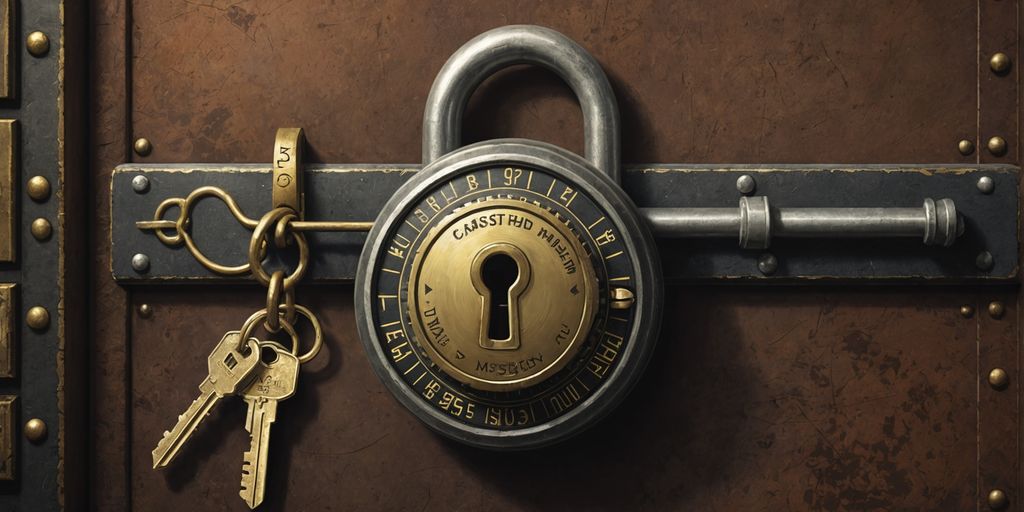In today’s digital world, passwords are like the keys to your online life. They protect your personal info, bank details, and more. But with so many accounts, how do you create passwords that are both strong and easy to remember? This guide will show you how to make strong passwords and keep them in your memory.
Key Takeaways
- Strong passwords are essential for protecting personal and financial information.
- A good password should be long, complex, and include symbols and numbers.
- Using mnemonic devices and unique passphrases can help you remember your passwords.
- Password managers can create and store strong passwords for you.
- Regularly updating your passwords and using two-factor authentication can enhance security.
The Importance of Strong Passwords

Protecting Personal Information
Passwords are a big part of our lives in the digital age. We use them so often that it’s easy to forget how important it is to make them strong. Almost all our private information is stored behind a password. If someone gets hold of it, they could mess with our personal and financial life. A strong password acts like a lock that keeps your personal info safe.
Preventing Unauthorized Access
In a professional setting, strong passwords help protect sensitive company information, including client data, proprietary research, and internal communications from being compromised. Without strong passwords, unauthorized people could get into your accounts and cause a lot of trouble.
Mitigating Risks of Data Breaches
Data breaches happen almost every day, and they can be really bad. Strong passwords make it harder for hackers to get into your accounts. This lowers the risk of your data being stolen.
It’s better to be safe than sorry. Using strong passwords can save you from a lot of headaches later on.
Characteristics of a Strong Password
Length and Complexity
A strong password should be long and complex. Aim for at least 12 to 15 characters. The longer the password, the harder it is to crack. Complexity is also key, so mix uppercase and lowercase letters, numbers, and symbols.
Use of Symbols and Numbers
Adding symbols and numbers to your password makes it even stronger. For example, instead of just using letters, throw in some numbers and special characters like @, #, or $. This makes it much harder for someone to guess.
Avoiding Common Words and Patterns
Stay away from common words and patterns. Passwords like “123456” or “password” are too easy to guess. Also, avoid using personal information like birthdays or pet names. The more random your password, the better.
Remember, a strong password is your first line of defense against unauthorized access. Make it count!
Creating Memorable Yet Strong Passwords

Using Mnemonic Devices
Mnemonic devices are a great way to create passwords that are both strong and easy to remember. By using a phrase or a set of words that are meaningful to you, you can create a password that is hard for others to guess. For example, take the first letter of each word in a sentence you can easily recall, and mix in some numbers and symbols.
Crafting Unique Passphrases
A passphrase is a sequence of words or other text that is easy for you to remember but hard for others to guess. Instead of a single word, use a combination of unrelated words. For instance, “BlueCarrot!29Elephant” is much stronger than “password123”. The length and randomness make it secure.
Incorporating Personal Elements
Adding personal elements to your passwords can make them more memorable. Think of a favorite hobby, a pet’s name, or a memorable date. Combine these with numbers and symbols to create a unique password. Just make sure these elements aren’t easily found on your social media profiles.
Tips for Remembering Strong Passwords
Repetition and Practice
One of the best ways to remember your passwords is through repetition and practice. By frequently typing your passwords, you can commit them to memory. Try logging into your accounts regularly to keep the passwords fresh in your mind.
Writing Down Passwords Securely
If you find it hard to remember all your passwords, consider writing them down. However, make sure to store this information in a safe place. Avoid keeping it near your computer or in an easily accessible location. A locked drawer or a safe can be good options.
Using Memory Techniques
Memory techniques can be very helpful. For example, you can use mnemonic devices to create a story or a phrase that helps you remember your password. Another method is to break the password into smaller chunks and memorize each part separately.
Sometimes, it might be necessary to upgrade your computer memory for improved performance. Understand needs, gather tools, and safely install RAM in desktops and laptops. Consider professional help for complex configurations or persistent issues.
The Role of Password Managers

Benefits of Using a Password Manager
Password managers are incredibly useful tools for anyone looking to improve their online security. They can generate and store strong, unique passwords for all your accounts. This means you only need to remember one master password to access all your other passwords. This makes it easier to use strong passwords everywhere, which is crucial for protecting your used desktops and computer printers. We recommend LastPass, but use the one you feel is best.
Popular Password Manager Options
There are many password managers available, each with its own set of features. Some popular options include those that offer security dashboards, automated password changers, and more. These tools can help you keep track of your passwords and ensure they are strong and unique.
How to Choose the Right Password Manager
When choosing a password manager, consider the features that are most important to you. Do you need a tool that integrates with all your devices? Or perhaps one that offers a security dashboard to warn you about weak passwords? Make a list of your needs and compare different options to find the best fit for you.
Using a password manager is one of the easiest ways to improve your online security. It takes the hassle out of creating and remembering strong passwords, so you can focus on more important things, like finding the best computer printers for your home or office.
How to Use a Password Manager Effectively
Setting Up Your Password Manager
Getting started with a password manager is simple. First, download and install the software on your device. Next, create a strong master password that you’ll use to access the manager. This is the only password you’ll need to remember, so make it both strong and memorable.
Generating Strong Passwords
One of the best features of a password manager is its ability to generate strong, unique passwords for each of your accounts. This saves you time and ensures that each password is difficult to crack. Simply use the built-in password generator to create passwords that include a mix of letters, numbers, and symbols.
Storing and Retrieving Passwords
With your password manager set up, you can start storing your passwords. Whenever you create a new account or update an existing password, save it in the manager. When you need to log in, simply open the manager and retrieve the password. This way, you don’t have to remember each password individually.
Using a password manager helps here, as it can create strong passwords and remember them for you. But, even if you use a password manager, you’ll at least need to create and remember a strong password for your password manager.
Common Mistakes to Avoid

When it comes to creating passwords, there are some common mistakes that people often make. Avoiding these can help keep your accounts secure.
Reusing Passwords
Using the same password for multiple accounts is a big no-no. If one account gets hacked, all your other accounts are at risk too. Always use unique passwords for each account to stay safe.
Sharing Passwords
Sharing your passwords with others, even friends or family, can lead to trouble. You never know where your password might end up. Keep your passwords to yourself to avoid unauthorized access.
Ignoring Security Updates
Skipping security updates is like leaving your front door unlocked. These updates often fix vulnerabilities that hackers can exploit. Make sure to install updates promptly to keep your accounts secure.
Omaha Computing Solutions presents a guide to secure Windows 11: update regularly, use antivirus, configure firewall, enable user account control, encrypt with BitLocker, use VPN, password manager, and backup solutions.
By avoiding these common mistakes, you can significantly improve your password security and protect your personal information from unauthorized access.
Advanced Techniques for Password Security
Two-Factor Authentication
Two-factor authentication (2FA) adds an extra layer of security by requiring not just a password but also a second form of verification. This could be a text message, an email, or an authentication app. This makes it much harder for hackers to gain access to your accounts, even if they have your password.
Regularly Updating Passwords
Regularly updating your passwords is crucial for maintaining security. Over time, passwords can become compromised without your knowledge. By changing them frequently, you reduce the risk of unauthorized access. Set reminders to update your passwords every few months.
Monitoring for Security Breaches
Keeping an eye on your accounts for any unusual activity is essential. Many services offer alerts for suspicious login attempts or changes to account settings. If you notice anything out of the ordinary, take action immediately to secure your account.
Discover key steps to bolster incident response readiness, guided by insights from the Microsoft incident response team.
By following these advanced techniques, you can create a proactive incident response plan and ensure your accounts remain secure.
Keeping Your Passwords Secure
Avoiding Phishing Scams
Phishing scams are one of the most common ways hackers steal passwords. Always double-check the sender’s email address and avoid clicking on suspicious links. Never share your passwords through email or text messages. If something feels off, it probably is.
Using Secure Connections
When accessing sensitive information, make sure you’re on a secure connection. Look for “https” in the URL and avoid using public Wi-Fi for logging into important accounts. A secure connection helps keep your data safe from prying eyes.
Regularly Reviewing Account Activity
It’s a good habit to regularly check your account activity for any unusual actions. If you notice anything strange, change your password immediately. This simple step can help you catch potential breaches early and keep your accounts secure.
Regularly reviewing your account activity can help you catch potential breaches early and keep your accounts secure.
By following these tips, you can better protect your passwords and keep your personal information safe. Whether you’re using refurbished laptops or refurbished desktop computers, these practices are essential for maintaining your digital security.
Why You Should Regularly Update Your Passwords
Regularly updating your passwords is a crucial step in maintaining your online security. Even the strongest passwords can become vulnerable over time. By changing them frequently, you reduce the risk of unauthorized access to your accounts.
Understanding Password Lifespan
Passwords have a limited lifespan. Over time, they can be exposed through data breaches or other security incidents. Updating your passwords every few months ensures that even if a hacker gets hold of one, it will likely be outdated by the time they try to use it.
Setting Up Reminders
To make sure you update your passwords regularly, set up reminders. You can use calendar alerts or apps designed to help you keep track of when it’s time to change your passwords. This way, you won’t forget to update them.
Best Practices for Updating Passwords
When updating your passwords, follow these best practices:
- Use a Password Manager: A password manager can help you generate and store strong, unique passwords for each of your accounts.
- Avoid Reusing Passwords: Make sure each account has a different password to prevent multiple accounts from being compromised if one password is stolen.
- Incorporate Symbols and Numbers: Adding symbols and numbers to your passwords makes them harder to crack.
- Stay Informed: Keep up with the latest security news to be aware of any breaches that might affect your accounts.
Updating your passwords regularly is a simple yet effective way to protect your personal information and reduce the risk of unauthorized access.
By following these tips, you can keep your accounts secure and enjoy peace of mind knowing that your information is protected.
Final Takeaways
Creating strong passwords and remembering them doesn’t have to be a daunting task. By using a mix of simple tricks and tools like password managers, you can keep your online accounts secure without the headache of memorizing complex strings. Remember, the key is to make your passwords both strong and memorable. Whether you choose to use a quirky passphrase or rely on a password manager, the important thing is to stay consistent and vigilant. With these tips, you can enjoy peace of mind knowing your personal information is well-protected.
Frequently Asked Questions
Why are strong passwords important?
Strong passwords help keep your personal info safe from hackers and prevent unauthorized access to your accounts.
What makes a password strong?
A strong password is long, uses a mix of letters, numbers, and symbols, and avoids common words or patterns.
How can I create a password that’s both strong and easy to remember?
You can use mnemonic devices, unique passphrases, or personal elements to make strong passwords that are also memorable.
Is it safe to write down my passwords?
It’s okay to write them down if you store them in a secure place, like a locked drawer, but avoid keeping them on your computer or phone.
What is a password manager and why should I use one?
A password manager creates and stores strong passwords for you, so you only need to remember one master password.
How do I choose the right password manager?
Look for a password manager that offers strong encryption, is easy to use, and has good reviews from other users.
What are some common mistakes to avoid with passwords?
Avoid reusing passwords, sharing them with others, and ignoring security updates.
How often should I update my passwords?
It’s a good idea to update your passwords regularly, like every few months, to keep your accounts secure.








